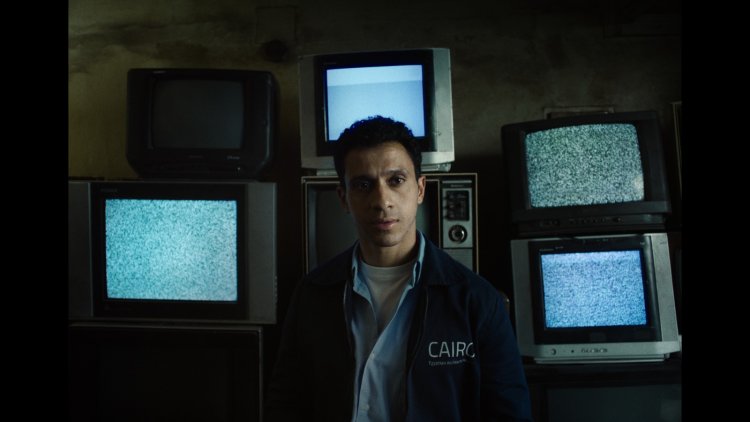
Seeking Haven for Mr. Rambo transcends its modest budget to deliver an emotionally rich and visually authentic portrayal of a life in Cairo we rarely see. Khaled Mansour’s directorial vision resonates with soulful clarity, revealing not only the layered struggles of its characters but also the complexities of the city they inhabit.
At its core, the film tells the story of Hassan, whose bond with his dog, Rambo, becomes both a refuge and a source of conflict. When an unfortunate incident thrusts Rambo into the crosshairs of a hostile confrontation with Karem, the landlord and local mechanic, the stakes rise. Pressured by a merciless community to give up his dog, Hassan refuses. In a desperate bid to protect Rambo, he must navigate a city as unforgiving as it is vibrant. This is a tale of loyalty, resilience, and the human need for connection in an environment that often challenges it.
Animals in Egyptian cinema are often symbolic or relegated to secondary roles, serving as extensions of human characters or plot devices. Seeking Haven for Mr. Rambo defies this norm, elevating Rambo to a central role and treating him as a fully realized character. For many Egyptian audiences, this is a novel and emotionally impactful experience.
The film’s choice of real, raw locations, reminiscent of Mohamed Khan and Khairy Beshara’s works, roots the story in a tangible, relatable Cairo. The city comes alive as a character of its own, with ambient sounds seamlessly woven into the narrative. This realism is further elevated by cinematography that balances artistry with restraint. Recurring green neon lights cut through Cairo’s darkness, creating a melancholic yet immersive aesthetic. More than a visual motif, the green light symbolizes fleeting hope amid the harshness of Hassan and Rambo’s world.
Fixed-camera shots following Hassan and Rambo through Cairo’s neighborhoods bring the audience closer to their journey, immersing us in their world. However, the film’s emphasis on the city’s ugliness can feel overly harsh at times, leaving little room for the nuanced beauty that could have balanced the tone.

Essam Omar delivers a standout performance as Hassan, striking the perfect balance between restraint and expression. His portrayal captures Hassan’s deep-seated fear of abandonment, rooted in the pain of being deserted by his father. This emotional scar informs every aspect of Hassan’s character, driving his relentless determination to protect Rambo. For Hassan, Rambo is more than a dog—he is a promise to himself to break the cycle of abandonment that defined his childhood.
Samaa Ibrahim’s effortless performance as Hassan’s mother is another highlight, bringing genuine warmth and depth to her character. Ahmed Bahaa surprises with a grounded and compelling debut performance as Karem, leaving a lasting impression despite limited screen time. Rakeen Saad’s portrayal of Asmaa is a testament to understated acting, using subtle reactions and small movements to reveal the character’s inner world. Her ability to convey vulnerability, strength, and hesitation makes Asmaa a relatable and memorable presence.
One of the film’s smart achievements is its ability to introduce character backgrounds without heavy-handed exposition. For example, Asmaa’s Alexandria roots are subtly conveyed through shifts in her dialect and pronunciation, adding authenticity to her character without overt explanations.
Mansour’s use of symbolism adds layers of meaning throughout the film. A particularly striking moment occurs when Hassan removes a security tag stained with blood, with the sign “Al-Mo’ez Al-Mozel” (“He who exalts and humiliates”) looming above—a visual metaphor for his struggles and survival.

The film’s authenticity shines in its portrayal of Egypt’s socio-economic diversity. Rather than resorting to clichéd stereotypes, it immerses us in a richly textured world where the struggles of the working class are depicted with nuance and respect. This grounded approach enriches the story, making it both universally relatable and deeply rooted in its Egyptian context.
With this debut, Khaled Mansour establishes himself as a director of substance, unafraid to lay bare his soul in his work. Essam Omar, in his first leading role, proves himself a force to be reckoned with, while Rambo becomes a silent yet unforgettable star.
Seeking Haven for Mr. Rambo is more than a film; it’s an experience that lingers. It captures the soul of a city and the quiet resilience of its people with unflinching honesty. The exploration of human connection—whether between a man and his dog or a family struggling to stay afloat—resonates deeply. This film is a testament to what Egyptian cinema can achieve when passion meets precision, inviting audiences to feel, reflect, and carry its echoes long after the credits roll.
Rating: 9/10 ★★★★★★★★★✩
